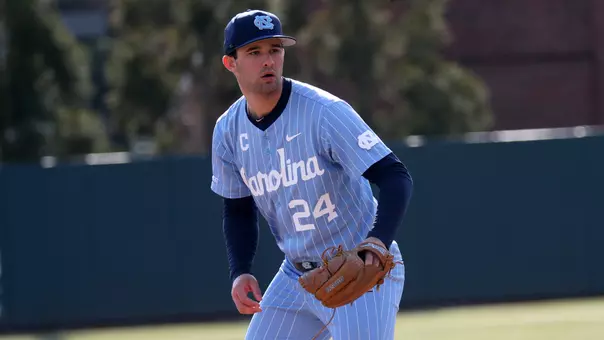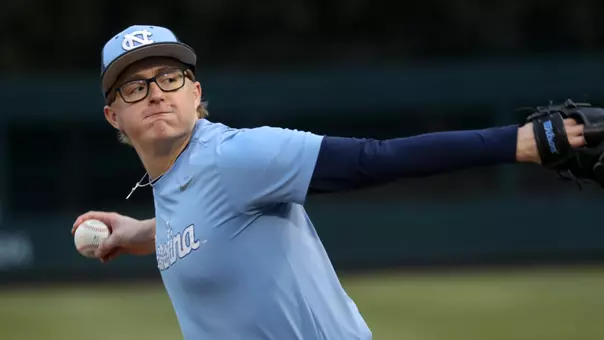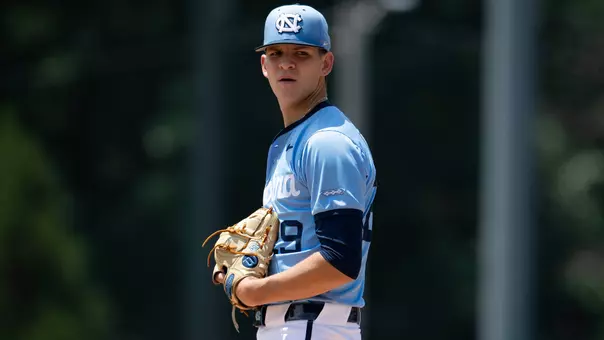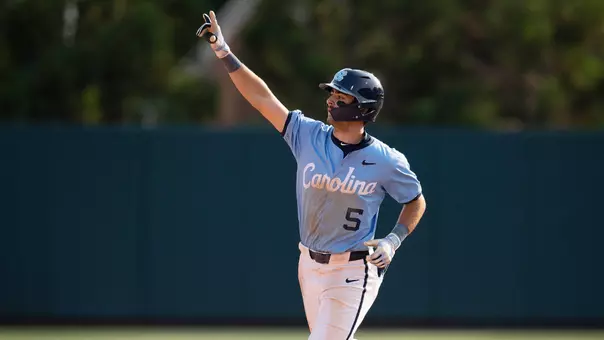University of North Carolina Athletics
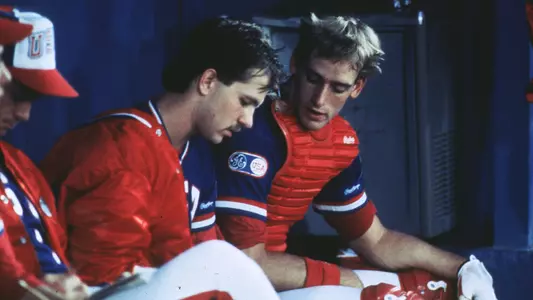
Baseball Olympians Reflect On '84 Games
August 6, 2024 | Baseball
CHAPEL HILL, N.C. – A glance through the history books reveals that 1984 was one of the most significant years in American history.
Steve Jobs introduced the MacIntosh personal computer in the United States, the Space Shuttle Discovery was launched, the World's Fair was held in New Orleans, Ronald Reagan was re-elected President of the United States by a landslide margin and the Games of the XXIII Olympiad were held in Los Angeles.
Today, August 6, is the 40th anniversary of the start of the medal round of the first Olympic baseball tournament in Los Angeles, which will return to the program when our national pastime celebrates its return to the games in 2028 in the city of Angels.
"I'm fortunate I got to go to the Olympics as a baseball player," said B.J. Surhoff, former UNC All-America catcher, reflecting on the 1984 U.S. Olympic baseball team. "As a baseball player, you never really saw that as a path until [it was added as a demonstration sport in 1984]. It was never a realistic thing."
Baseball was included in the Olympic program after a 20-year hiatus in 1984, and for the first time, it had a tournament format.
Surhoff and fellow Carolina All-America pitcher and battery mate Scott Bankhead were part of the loaded U.S. roster, featuring future National Baseball Hall of Famer Barry Larkin and All-Stars Will Clark and Mark McGwire.
Team USA rolled through pool play with a 3-0 record, outscoring its opponents by a combined 22 runs before defeating South Korea, 5-2, in the semifinals.
Unfortunately, the Americans lost to Japan, 6-3, in the championship game.
"Anything that could go wrong went wrong that day," Surhoff said. "We didn't hit; we had a guy slip coming around third; they had good pitching, but we had a bad game. We probably beat them nine out of 10, but it was just one of those games."
"Still, to this day, it's great to have an Olympic medal," Bankhead explained. A lot of the guys take pride in the fact that we got things started.
"There haven't been very many U.S. Olympic baseball teams, and to be one of those few who had the chance to represent this country on the diamond is truly special."
Baseball debuted as an exhibition sport at the 1900 Summer Olympics in Paris but didn't become an official Olympic sport until the 1992 games in Barcelona.
The United States played exhibition baseball games at the Olympic games in 1904, 1912, 1936, 1956 and 1964 before the sport was excluded altogether.
In 1978, Los Angeles was awarded the 1984 Summer Olympics, and representatives from the Dodgers and private businesses submitted a proposal to have baseball back in the games, which the International Olympic Committee (IOC) accepted.
Once the 30-man traveling team was selected, the United States embarked on a 33-game, cross-country tour against various minor league and college teams throughout the summer, including 19 cities in 19 days.
The tour included a game at Durham Athletic Park, where Bankhead and Surhoff donned the Stars and Stripes in front of their family and friends.
"It was a whirlwind, because this was the first time the game was back in the Olympics, so they really wanted to promote it and get people behind it," Surhoff said. "There were no charter flights, but there were a lot of early morning flights and naps sitting on the airport floors. It was grueling."
At the end of the tour, the roster was narrowed to 20 for the final trip to L.A. to compete in the games.
Although he wasn't guaranteed a spot on the roster, Surhoff was on the United States Pan-Am Games team in 1983 and was confident that he would be on the Olympic squad and that his Tar Heel teammate would join him.
Bankhead didn't lose a game in his final two seasons at UNC, going 20-0 with a 1.89 ERA and 209 strikeouts in 171 2/3 innings pitched.
"[UNC] played at Arizona State that year in a three-game series, and Scott pitched great," Surhoff explained. "One of the [U.S.] assistant coaches, who was close with coach [Rod] Dedeaux, came to watch. He came up to me afterward and said, 'We're not going to L.A. without him.'"
Of the 20 players on the roster, 13 were first-round draft picks in 1984 and five went during the first round in 1985. Bankhead was drafted by the Kansas City Royals in '84, and Surhoff was selected first overall by Milwaukee the following year.
"You had to play well and earn your way onto the team," Bankhead said. "There was a lot of satisfaction in making that final roster. There were a lot of very, very good players that didn't go forward with us."
Future MLB All-Stars Ken Caminiti, Norm Charlton and Greg Swindell were among those who failed to make the final cut.
Bankhead and Surhoff had spent the entire summer tour as roommates after having played together at Carolina for two seasons.
"I think it helped him a little bit having me early because I was on the team the year before, even though he knew some of the guys from the [Cape Cod Baseball League]," Surhoff said. "There was a comfort level with me catching him and him throwing to me."
Bankhead made two starts in Los Angeles, picking up the win over Italy in pool play and earning a no-decision against South Korea in the semifinals.
The United States scored nine runs in the top of the first against the Italians en route to a 16-1 victory.
"To go out there with a big lead calmed me down a lot," Bankhead stated. "There were 50,000 people in the stands and the atmosphere was phenomenal. I pitched well against Italy and got the opportunity to pitch again."
The Americans shut out the Dominican Republic the following game, 12-0, to advance to the semifinals.
The 16-game, eight-day tournament at Dodger Stadium drew over 385,000 fans to Chavez Ravine, including more than 55,000 for the championship game against Japan.
"It helped promote the game, and that was part of what they were trying to do," Surhoff said.
Surhoff batted .303 with two home runs and 13 RBIs in 19 games during the summer of '84, while Bankhead pitched in 42.0 innings with 44 strikeouts and a 0.86 ERA in 10 appearances.
"I don't remember much of the details about the baseball games, but more so the experience and my teammates," Bankhead said. "I remember all the Olympic athletes meeting with President Reagan before the opening ceremonies and being a part of the Olympic Village.
"Mingling and walking around with all the other Olympians, especially the other American athletes that we would see and eat breakfast or lunch with, are my most vivid memories now. I was in awe of it all."
Steve Jobs introduced the MacIntosh personal computer in the United States, the Space Shuttle Discovery was launched, the World's Fair was held in New Orleans, Ronald Reagan was re-elected President of the United States by a landslide margin and the Games of the XXIII Olympiad were held in Los Angeles.
Today, August 6, is the 40th anniversary of the start of the medal round of the first Olympic baseball tournament in Los Angeles, which will return to the program when our national pastime celebrates its return to the games in 2028 in the city of Angels.
"I'm fortunate I got to go to the Olympics as a baseball player," said B.J. Surhoff, former UNC All-America catcher, reflecting on the 1984 U.S. Olympic baseball team. "As a baseball player, you never really saw that as a path until [it was added as a demonstration sport in 1984]. It was never a realistic thing."
Baseball was included in the Olympic program after a 20-year hiatus in 1984, and for the first time, it had a tournament format.
Surhoff and fellow Carolina All-America pitcher and battery mate Scott Bankhead were part of the loaded U.S. roster, featuring future National Baseball Hall of Famer Barry Larkin and All-Stars Will Clark and Mark McGwire.
Team USA rolled through pool play with a 3-0 record, outscoring its opponents by a combined 22 runs before defeating South Korea, 5-2, in the semifinals.
Unfortunately, the Americans lost to Japan, 6-3, in the championship game.
"Anything that could go wrong went wrong that day," Surhoff said. "We didn't hit; we had a guy slip coming around third; they had good pitching, but we had a bad game. We probably beat them nine out of 10, but it was just one of those games."
"Still, to this day, it's great to have an Olympic medal," Bankhead explained. A lot of the guys take pride in the fact that we got things started.
"There haven't been very many U.S. Olympic baseball teams, and to be one of those few who had the chance to represent this country on the diamond is truly special."
Baseball debuted as an exhibition sport at the 1900 Summer Olympics in Paris but didn't become an official Olympic sport until the 1992 games in Barcelona.
The United States played exhibition baseball games at the Olympic games in 1904, 1912, 1936, 1956 and 1964 before the sport was excluded altogether.
In 1978, Los Angeles was awarded the 1984 Summer Olympics, and representatives from the Dodgers and private businesses submitted a proposal to have baseball back in the games, which the International Olympic Committee (IOC) accepted.
Once the 30-man traveling team was selected, the United States embarked on a 33-game, cross-country tour against various minor league and college teams throughout the summer, including 19 cities in 19 days.
The tour included a game at Durham Athletic Park, where Bankhead and Surhoff donned the Stars and Stripes in front of their family and friends.
"It was a whirlwind, because this was the first time the game was back in the Olympics, so they really wanted to promote it and get people behind it," Surhoff said. "There were no charter flights, but there were a lot of early morning flights and naps sitting on the airport floors. It was grueling."
At the end of the tour, the roster was narrowed to 20 for the final trip to L.A. to compete in the games.
Although he wasn't guaranteed a spot on the roster, Surhoff was on the United States Pan-Am Games team in 1983 and was confident that he would be on the Olympic squad and that his Tar Heel teammate would join him.
Bankhead didn't lose a game in his final two seasons at UNC, going 20-0 with a 1.89 ERA and 209 strikeouts in 171 2/3 innings pitched.
"[UNC] played at Arizona State that year in a three-game series, and Scott pitched great," Surhoff explained. "One of the [U.S.] assistant coaches, who was close with coach [Rod] Dedeaux, came to watch. He came up to me afterward and said, 'We're not going to L.A. without him.'"
Of the 20 players on the roster, 13 were first-round draft picks in 1984 and five went during the first round in 1985. Bankhead was drafted by the Kansas City Royals in '84, and Surhoff was selected first overall by Milwaukee the following year.
"You had to play well and earn your way onto the team," Bankhead said. "There was a lot of satisfaction in making that final roster. There were a lot of very, very good players that didn't go forward with us."
Future MLB All-Stars Ken Caminiti, Norm Charlton and Greg Swindell were among those who failed to make the final cut.
Bankhead and Surhoff had spent the entire summer tour as roommates after having played together at Carolina for two seasons.
"I think it helped him a little bit having me early because I was on the team the year before, even though he knew some of the guys from the [Cape Cod Baseball League]," Surhoff said. "There was a comfort level with me catching him and him throwing to me."
Bankhead made two starts in Los Angeles, picking up the win over Italy in pool play and earning a no-decision against South Korea in the semifinals.
The United States scored nine runs in the top of the first against the Italians en route to a 16-1 victory.
"To go out there with a big lead calmed me down a lot," Bankhead stated. "There were 50,000 people in the stands and the atmosphere was phenomenal. I pitched well against Italy and got the opportunity to pitch again."
The Americans shut out the Dominican Republic the following game, 12-0, to advance to the semifinals.
The 16-game, eight-day tournament at Dodger Stadium drew over 385,000 fans to Chavez Ravine, including more than 55,000 for the championship game against Japan.
"It helped promote the game, and that was part of what they were trying to do," Surhoff said.
Surhoff batted .303 with two home runs and 13 RBIs in 19 games during the summer of '84, while Bankhead pitched in 42.0 innings with 44 strikeouts and a 0.86 ERA in 10 appearances.
"I don't remember much of the details about the baseball games, but more so the experience and my teammates," Bankhead said. "I remember all the Olympic athletes meeting with President Reagan before the opening ceremonies and being a part of the Olympic Village.
"Mingling and walking around with all the other Olympians, especially the other American athletes that we would see and eat breakfast or lunch with, are my most vivid memories now. I was in awe of it all."
Carolina Insider - Interview with Nyla Harris (Full Segment) - February 6, 2026
Monday, February 09
UNC Gymnastics: Tar Heels Edged by NC State in Raleigh
Sunday, February 08
WBB: Post-Wake Forest Press Conference - Feb. 8, 2026
Sunday, February 08
UNC Women's Basketball: Brooks, Harris Push Heels Past Wake Forest, 84-56
Sunday, February 08







